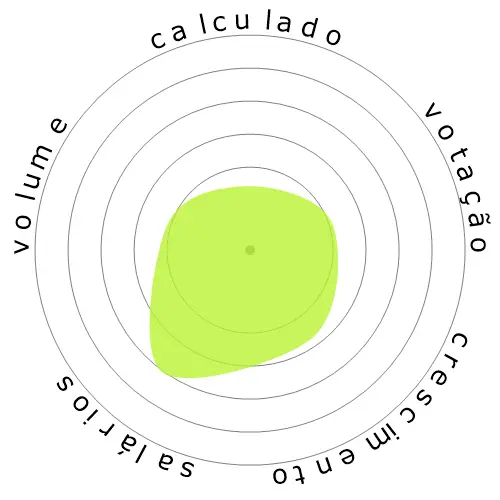Escritores Técnicos




As pessoas também visualizaram
Risco de automação calculado
Risco Iminente (81-100%): Ocupações neste nível têm uma probabilidade extremamente alta de serem automatizadas num futuro próximo. Esses trabalhos consistem principalmente em tarefas repetitivas e previsíveis, com pouca necessidade de julgamento humano.
Mais informações sobre o que é essa pontuação e como ela é calculada estão disponíveis aqui.
Enquete do usuário
Nossos visitantes votaram que estão incertos se esta ocupação será automatizada. No entanto, o nível de risco de automação que geramos sugere uma chance muito maior de automação: 94% chance de automação.
O que você acha que é o risco da automação?
Qual é a probabilidade de que Escritores Técnicos seja substituído por robôs ou inteligência artificial nos próximos 20 anos?
Sentimento
O gráfico a seguir é incluído sempre que há uma quantidade substancial de votos para gerar dados significativos. Essas representações visuais mostram os resultados das enquetes dos usuários ao longo do tempo, fornecendo uma indicação importante das tendências de sentimento.
Sentimento ao longo do tempo (anualmente)
Crescimento
Espera-se que o número de vagas de emprego para 'Technical Writers' aumente 4,0% até 2033
Emprego total e estimativa de vagas de emprego
As projeções atualizadas são devidas 09-2025.
Salários
Em 2023, o salário anual mediano para 'Technical Writers' foi de $ 80.050, ou $ 38 por hora
'Technical Writers' receberam 66,6% a mais do que o salário médio nacional, que era de $ 48.060
Salários ao longo do tempo
Volume
A partir de 2023 havia 47.970 pessoas empregadas como 'Technical Writers' dentro dos Estados Unidos.
Isso representa cerca de < 0,001% da força de trabalho empregada em todo o país
Dito de outra maneira, cerca de 1 em 3 mil pessoas são empregadas como 'Technical Writers'.
Descrição do trabalho
Escreva materiais técnicos, como manuais de equipamentos, apêndices ou instruções de operação e manutenção. Pode auxiliar no trabalho de layout.
SOC Code: 27-3042.00


Comentários
Leave a comment
The main challenge for an AI is not the technical writing. It is actually making sense of the source material. This will be the main job of technical writers: Explaining to the AI what it needs to write. Technical writers will increasingly be busy with post-editing AI written texts, which will be a very mind numbing task. It will also require fewer people and warrant lower pay.
If you want to know the future of technical writing, look at what has happened to technical translation. If you are a technical writer, you are headed the same way. You will operate AI tools and check the results for lousy pay because you are not actually doing the brain work. Get into nursing or open a funeral home. People will always get sick and die, that's a future-proof occupation.
Curating and organizing the information to feed to the AI, and checking their output for accuracy, may be one of the few jobs left to tech writers.
As technical writers we understand complex systems (as well as the engineer's gibberish that often comes with it) and are able to translate this into a form that is easily understood by the respective user groups, i.e. operators or maintenance personnel.
In my opinion AI nowadays can provide draft text to the technical writers. But it takes a human to process that into understandable content, because only a human can know what is necessary for others to profit from precise instructions and related warnings. Also when it comes to jurisdiction.
Who will be held accountable for injury or death caused by automated AI that simply pretends to be human-like but has otherwise no conscience? I mean, an AI can tell you that a stove is hot, but does this mean it really knows the consequences of touching it?
Some learned it the hard way, I doubt an AI can.
I don’t see this role being completely automated in 10 years.
More importantly, why would anyone pay for a professional to do it?
We are already implementing automated structured reuse on a large scale. People should not underestimate the potential of computational linguistics when combined with machine learning and a knowledge graph-rich future.
Although intelligent content (structured content with human-declared intent) cannot be automated yet, we are already auto-classifying content with additional semantic metadata (taxonomies). AI/ML will continue to assist and eventually replace a significant portion of low-level content development, which will elevate the writer's role to that of an information architect/designer.
Object-oriented content will then become a service called Content-as-a-Service (CaaS), much like an electrical distribution grid.
In TechComm and MarComm, we have been evolving towards this model for many years.
I cannot fathom how AI would somehow be able to do all the things that are required to be done in order to complete a technical writing piece.
AI has already taken over the writing niche . . . people no longer need education to write, software helps them do it. That is all AI could ever do for a writer.
Deixe uma resposta sobre esta ocupação